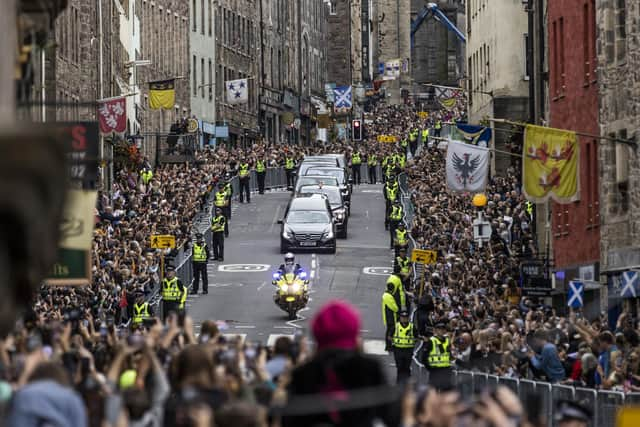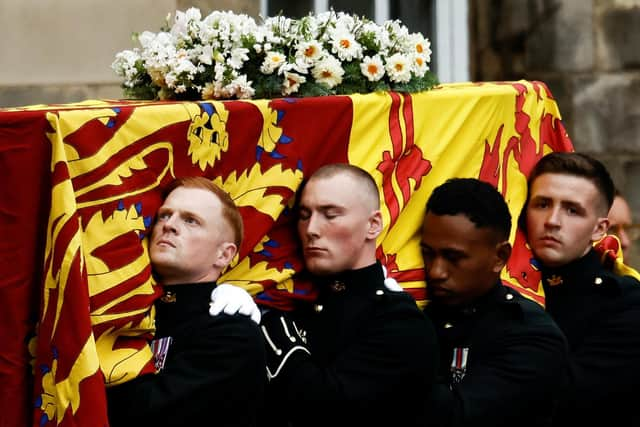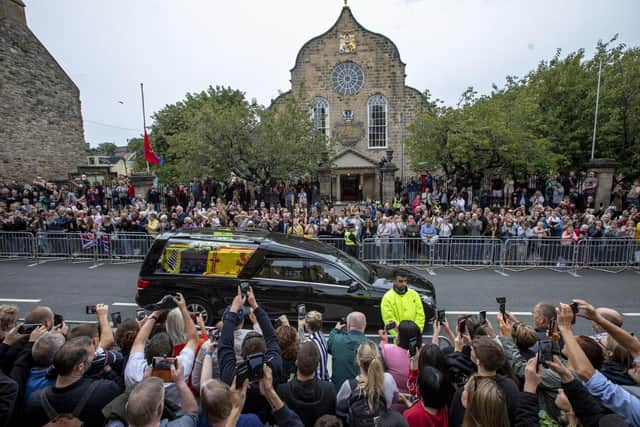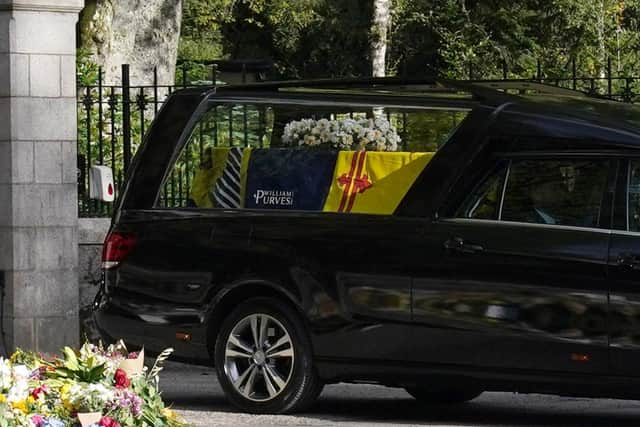Thousands line Queen’s coffin route to pay final respects in Scotland
and live on Freeview channel 276
Silent, sombre and respectful, well-wishers gathered beside country roads, bridges and in village and city centres to say goodbye to the woman who was never more at home then when in Scotland.
By the time the procession reached its destination of Edinburgh’s Palace of Holyroodhouse, after more than six hours, the crowds were 10 deep in places on the famous Royal Mile, a famous thoroughfare the Queen knew well.
Advertisement
Hide AdAdvertisement
Hide AdThe Queen’s children and their spouses – Princess Royal and Vice Admiral Sir Tim Laurence, Duke of York and the Earl and Countess of Wessex – watched as soldiers from the Royal Regiment of Scotland carried the coffin into the Palace.


In a touching gesture, deference to the monarch was still observed, with the royal women curtseying and the men bowing their heads.
As the procession neared its end, flowers were thrown in front of the hearse – from William Purvis, a family run funeral directors based in Scotland – and spontaneous applause broke out from sections of the crowds in the Royal Mile.
At one point, as the cortege travelled through Dundee, a lone long-stemmed flower could be seen on the hearse windscreen and in a rural part of the route farmers paid homage to the Queen with tractors lined up in a field.
Advertisement
Hide AdAdvertisement
Hide AdThe Queen did not travel alone during her 180-mile journey, Anne and her husband were in a limousine as part of a procession directly behind her.


The First Minister of Scotland, Nicola Sturgeon, paid tribute to the Queen when her final journey through the Scottish Highlands began just after 10am.
Ms Sturgeon said in a tweet: “A sad and poignant moment as Her Majesty, The Queen leaves her beloved Balmoral for the final time.
“Today, as she makes her journey to Edinburgh, Scotland will pay tribute to an extraordinary woman.”
Advertisement
Hide AdAdvertisement
Hide AdThe Queen’s oak coffin, draped with the Royal Standard of Scotland with a wreath of Balmoral flowers on top, began its journey from the Queen’s summer sanctuary in the Highlands and the first settlement it reached was Ballater.


Locals from Ballater considered the Queen a neighbour with the monarch and her family often seen in the village in Royal Deeside, which she had visited since childhood and where the monarchy have space to be themselves.
Hundreds lined the village’s main street as the Queen’s coffin was driven slowly past, and behind the well-wishers many shops displayed photographs of the Queen as a mark of respect.
The hearse passed Glenmuick Church, where the Rev David Barr rang the church bells 70 times after the Queen’s death was announced.
Advertisement
Hide AdAdvertisement
Hide AdFlowers were thrown into its path by villagers on both sides of the road in Ballater, which was sombre and silent.


The hearse slowed to a fast walking pace and mourners could clearly see the royal standard-draped coffin and the wreath featuring flowers from the Balmoral estate, including sweet peas – one of the Queen’s favourite flowers – dahlias, phlox, white heather and pine fir.
Elizabeth Taylor, from Aberdeen, had tears in her eyes as she considered what she had just seen.
She said: “It was very emotional. It was respectful and showed what they think of the Queen.
“She certainly gave service to this country, even up until a few days before her death.”